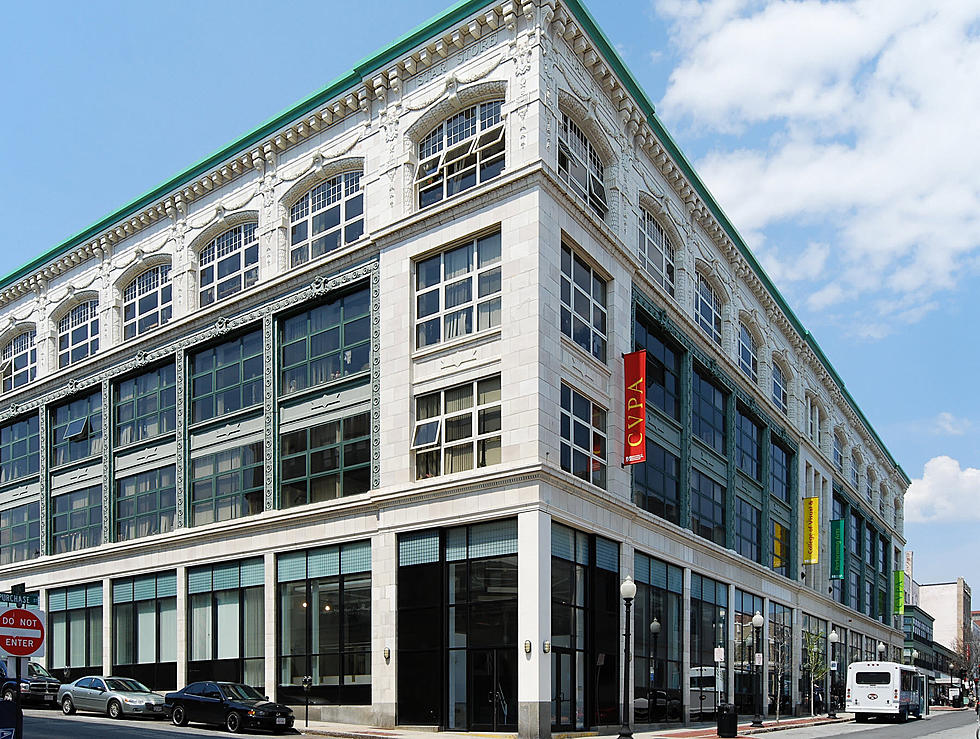
More Details on UMD Moving Out of New Bedford’s Star Store
BOSTON (SHNS) — After funding differences were settled on Beacon Hill, UMass Dartmouth leaders were told by attorneys that they had "no choice" but to vacate a New Bedford building that has housed studio arts programs for more than two decades, leaving some elected officials scratching their heads.
The Star Store building, where UMass Dartmouth offered programming for its College of Visual and Performing Arts for two decades, is pictured at 182 Union St. in New Bedford. [Wikimedia Commons/Marc Belanger]
University officials announced Monday they are immediately beginning the process of transitioning College of Visual and Performing Arts work out of the Star Store building. Courses taught there will return to the primary Dartmouth campus that already hosts most visual and performing arts classes, roughly five miles away, for the fall semester.
The dramatic decision follows more than a year of uncertainty about the future of UMass Dartmouth's tenure at the Star Store, located at 182 Union St. in New Bedford's downtown hub.

Although a 2022 law instructed the school and the state Division of Capital Asset Management and Maintenance to purchase the building, UMass Dartmouth officials were unsuccessful in their attempt to do so last year.
For the past several months, the school has been a "tenant at sufferance" in the building without an updated lease in place or new appropriations to cover rent and other costs, according to a summary of legal advice that outside counsel for the UMass Building Authority sent UMass Dartmouth Chancellor Mark Fuller on Aug. 9.
The fiscal year 2024 state budget Gov. Maura Healey signed last week does not direct any money toward the space for the first time in decades, even though both Healey and the House had recommended continued outlays.
After it became clear in late July that the new state budget would not include Star Store funding, the legal counsel suggested that remaining in the building as a tenant at sufferance is "ill-advised," concluding that UMD "has no choice but to vacate the Star Store" without any state money appropriated to cover rent, according to the memo, which a UMass Dartmouth spokesperson provided.
"Although UMass Dartmouth is on a strong upward trajectory, we face ongoing budgetary constraints as we begin to grow our way out of a 10-year enrollment decline. Simply put, even were the building gifted to UMBA for our use today, we could not afford to operate it next year without state assistance, much less make the most urgently needed repairs and begin to renovate it to meet the needs of the next generation of students," Chancellor Mark Fuller wrote in a message announcing the decision Monday. "A substantial portion of our operating budget is funded through tuition revenues, and the university could not take on such a large new financial obligation without burdening all 7,500 of our students -- who already face challenges in funding their educational aspirations -- with significant additional tuition increases for the next decade."
While school leaders felt their options were limited by state budget decisions, the announcement caught some other elected officials off guard.
"To say that I reacted with surprise and dismay is an understatement," said New Bedford Mayor Jon Mitchell, who penned a four-paragraph statement about what he dubbed a "short-sighted decision."
Mitchell said he offered his assistance to lawmakers, UMass, the Baker and Healey administrations, and the building owner with the hopes of facilitating a deal that would keep the school in place. Mitchell said none of the other parties accepted his offer for help, and he interpreted that as a sign that "a new agreement was merely a matter of time."
"The notion that the University's decision ultimately hinged on whether a particular line item was included in the new state budget strains credulity. All the state entities and legislators have long been aware of the need to develop a new funding arrangement for the CVPA at the Star Store that would address the acquisition, maintenance, and operating costs once the original lease expired in 2021," Mitchell said. "All the parties have had several years to structure an agreement which would put the CVPA on a firm, long-term footing in our downtown. The failure to arrive at an agreement will now be felt by the students, faculty, residents, local businesses, and the City, which stands to lose a major anchor institution."
Since the mid-1990s, UMass Dartmouth has operated some programming out of the New Bedford building and the state has provided funding -- typically about $2.7 million per year -- to cover the satellite campus. Parties extended the lease for a year after it expired in August 2021.
The lease included an option allowing the state to purchase the building from owner Paul Downey for $1. Officials did not trigger that option during the original lease period, despite prodding along the way from some figures such as New Bedford Sen. Mark Montigny.
Former Gov. Charlie Baker on Aug. 4, 2022 signed a law instructing the University of Massachusetts Building Authority to execute the purchase option. Six days later, UMass and DCAMM file a notice of their intent to buy the building, writing that the transaction "is a priority for the Commonwealth and UMass Dartmouth and is important to the continued revitalization and economic development of downtown New Bedford."
But the purchase never went through. A UMass Dartmouth official said the landlord had raised legal challenges, and the lease then expired on Aug. 14, 2022.
UMass Dartmouth kept paying rent using funds appropriated in the fiscal year 2023 budget, but no more money is forthcoming. Both Healey and the House proposed another $2.7 million for the school's New Bedford center in their FY24 budget proposals, but the Senate moved to eliminate the funding, and the final spending bill that emerged from negotiations reduced that line item to zero.
The budget included an outside section prohibiting the use of state funds to maintain or renovate the facility until the building is purchased or conveyed by deed to the UMass Building Authority. It also instructed DCAMM and the UMass Building Authority to file a report with the inspector general by Oct. 1 detailing all expenses made after Sept. 7, 2021 from the state appropriation for the New Bedford school.
Montigny, who filed the original legislation in the 1990s as well as a budget amendment containing the outside section, was not available for an interview but in a statement criticized DCAMM and school officials for failing to make use of the $1 purchase option earlier.
"Despite objections, the university has decided to vacate the building that the legislature paid for with over 20 years of appropriations. I am deeply disappointed that DCAMM and the university neglected multiple opportunities to meet their basic responsibility to protect taxpayers and students by failing to secure the building in accordance with my original legislation that created and funded this campus as well as state law signed just last year," Montigny said in a statement. "As the lease and state law have required, the building should be immediately transferred for one dollar so that taxpayer money will no longer be squandered, and all the interested parties can work together to ensure Star Store's long-term future in downtown New Bedford. I will continue working directly with the Healey Administration to protect the public's long-term investment with integrity and transparency."
UMass Dartmouth's move affects 116 students who were set to participate in 24 "organized classroom activities" in the Star Store this fall, according to Fuller. He said that work will be relocated to other facilities "to the extent possible," adding that officials are working to secure temporary classrooms and find alternative space for the Worker's Education Program in New Bedford.
"Our highest priority must always be the safety of our students, staff and faculty. With the expiration of our most recent lease extension, legal counsel has advised me that UMass Dartmouth does not have the basic liability protections of a tenant in good standing," Fuller wrote.
The legal memo states that "without any rent income, we are concerned, in general, as to whether the landlord will take even minimum steps to maintain the property, and in particular, will be able to afford to keep insurance in place to reimburse anyone injured on the property. We have no transparency as to this issue, and as such it is a significant risk. As a tenant at sufferance, UMass Dartmouth does not have the right to any notice to quit prior to the commencement of a summary process action for eviction by the landlord."
— Chris Lisinski, State House News Service
More From WBSM-AM/AM 1420









